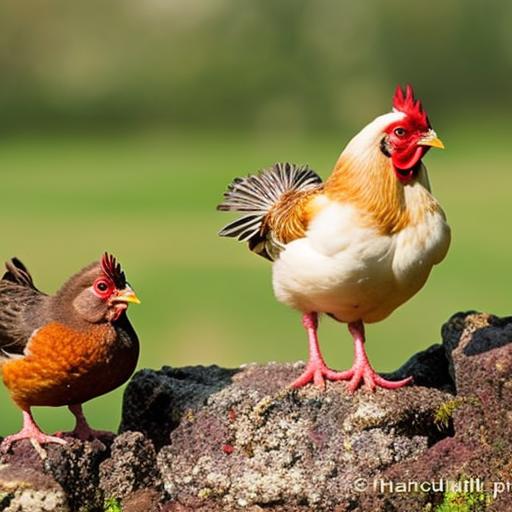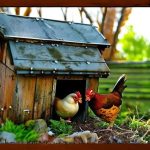Keeping chickens in Green Bay, WI has become increasingly popular in recent years. Many residents are discovering the joys and benefits of having their own flock of chickens in their backyard. I have personally experienced the joy and satisfaction of keeping chickens and would highly recommend it to anyone interested in sustainable living and self-sufficiency.
Key Takeaways
- Keeping chickens in Green Bay, WI is a popular and rewarding hobby.
- Benefits of keeping chickens include fresh eggs, natural pest control, and fertilizer for your garden.
- Legal requirements for keeping chickens in Green Bay include obtaining a permit and following zoning regulations.
- Choosing the right breed of chickens depends on your needs and preferences, such as egg-laying ability and temperament.
- Building a chicken coop requires careful planning and consideration of factors such as size, ventilation, and predator protection.
Benefits of keeping chickens in your backyard
One of the main benefits of keeping chickens in your backyard is the availability of fresh eggs. There is nothing quite like gathering eggs from your own flock and enjoying them for breakfast. Not only are they delicious, but they are also healthier than store-bought eggs, as they are free from antibiotics and hormones.
Another benefit of keeping chickens is the fertilizer they provide for your garden. Chicken manure is rich in nutrients and can be used to fertilize your plants, resulting in healthier and more productive gardens. Additionally, chickens can help control pests in your yard by eating insects and other small creatures that can damage your plants.
Keeping chickens also provides educational opportunities for children. They can learn about the life cycle of chickens, responsibility, and where their food comes from. It is a great way to teach them about sustainable living and the importance of caring for animals.
Legal requirements for keeping chickens in Green Bay, WI
Before starting your own flock, it is important to familiarize yourself with the legal requirements for keeping chickens in Green Bay, WI. Zoning regulations vary depending on where you live, so it is essential to check with your local government or homeowner’s association to ensure that you are allowed to keep chickens on your property.
In addition to zoning regulations, there may be a permitting process that you need to go through before keeping chickens. This may involve filling out an application, paying a fee, and meeting certain requirements such as providing adequate housing and fencing for the chickens.
The number of chickens allowed may also be regulated. Some areas have restrictions on the number of chickens you can keep based on the size of your property. It is important to check the specific regulations in your area to ensure that you are in compliance.
Choosing the right breed of chickens for your backyard
When choosing the right breed of chickens for your backyard, there are several factors to consider. The climate in Green Bay, WI can be harsh, so it is important to choose a breed that is cold-hardy and can withstand the cold winters.
Egg production is another important factor to consider. If you are primarily interested in having a steady supply of fresh eggs, then you will want to choose a breed that is known for its egg-laying capabilities. Some popular breeds for egg production include Rhode Island Reds, Leghorns, and Australorps.
Temperament is also an important consideration, especially if you have children or pets. Some breeds are known to be more docile and friendly, while others can be more aggressive or flighty. It is important to choose a breed that fits well with your family and lifestyle.
Building a chicken coop: Tips and tricks
Building a chicken coop is an essential part of keeping chickens in your backyard. The size and design of the coop will depend on the number of chickens you plan to keep and the available space in your yard.
When designing your chicken coop, it is important to consider ventilation, insulation, and predator protection. Good ventilation will help prevent moisture buildup and keep the chickens healthy. Insulation can help regulate temperature during extreme weather conditions. Predator protection is crucial to keep your chickens safe from predators such as raccoons, foxes, and hawks.
Materials needed for building a chicken coop include lumber, hardware cloth, roofing materials, and nesting boxes. It is important to use sturdy materials that can withstand the elements and provide adequate protection for your chickens.
You can choose to build your own chicken coop or purchase a pre-made option. Building your own coop allows for customization and can be a fun DIY project. However, if you are not comfortable with construction or do not have the time, there are many pre-made options available that can be easily assembled.
Feeding and caring for your backyard chickens

Feeding and caring for your backyard chickens is relatively easy and requires minimal effort. Chickens require a balanced diet that includes a combination of commercial feed, kitchen scraps, and foraging.
Commercial feed is readily available and provides the necessary nutrients for your chickens. It is important to choose a feed that is appropriate for the age and breed of your chickens. There are different types of feed available, including starter feed for chicks, grower feed for young chickens, and layer feed for hens.
In addition to commercial feed, you can supplement your chickens’ diet with kitchen scraps such as fruits, vegetables, and grains. It is important to avoid feeding them anything toxic or harmful, such as chocolate, onions, or avocado.
Watering systems should be provided to ensure that your chickens have access to clean and fresh water at all times. This can be done through waterers or automatic watering systems that are designed specifically for chickens.
Cleaning and maintenance of the chicken coop is also important to keep your chickens healthy. Regularly cleaning out the coop and replacing bedding will help prevent the buildup of bacteria and parasites. It is also important to regularly check for signs of illness or injury in your chickens and provide appropriate care.
Health and safety considerations for backyard chickens
Keeping backyard chickens comes with its own set of health and safety considerations. It is important to be aware of common health issues that can affect chickens and take appropriate measures to prevent or treat them.
Some common health issues in chickens include respiratory infections, parasites, and egg-laying problems. Regularly monitoring your chickens for signs of illness, providing a clean environment, and practicing good biosecurity measures can help prevent these issues.
Predator prevention is also important to keep your chickens safe. This can be done by providing secure fencing, using predator-proof locks on the coop, and installing motion-activated lights or alarms. It is important to be aware of the predators in your area and take appropriate measures to protect your flock.
Biosecurity measures are essential to prevent the spread of diseases between chickens and other animals. This includes quarantining new chickens before introducing them to the flock, practicing good hygiene when handling chickens, and regularly cleaning and disinfecting the coop and equipment.
Egg production: What to expect from your backyard chickens
The amount of eggs you can expect from your backyard chickens will depend on several factors, including the breed, age, and health of the chickens, as well as environmental factors such as daylight hours and temperature.
On average, a healthy laying hen can produce around 4-6 eggs per week. However, this can vary depending on the breed. Some breeds are known for their high egg production, while others may lay fewer eggs.
It is important to note that egg production can fluctuate throughout the year. Chickens typically lay fewer eggs during the winter months when daylight hours are shorter. However, with proper care and management, you can still expect a steady supply of eggs from your backyard flock.
When collecting eggs, it is important to handle them with care to prevent cracking or contamination. Eggs should be collected daily and stored in a cool and dry place. It is recommended to use them within 2-3 weeks for optimal freshness.
Common challenges and troubleshooting for backyard chicken owners
Keeping backyard chickens can come with its fair share of challenges. Some common challenges include egg-eating chickens, broody hens, and molting.
Egg-eating chickens can be a frustrating problem. This behavior can be caused by boredom or a lack of calcium in the diet. Providing plenty of enrichment and ensuring that your chickens have access to a balanced diet can help prevent this behavior.
Broody hens can also be a challenge, as they will stop laying eggs and become protective of their nest. This behavior is natural and can be difficult to break. Some strategies for dealing with broody hens include removing them from the nest, providing a separate area for them to brood, or introducing new chickens to disrupt their nesting behavior.
Molting is another common challenge for backyard chicken owners. Molting is the process of shedding old feathers and growing new ones. During this time, chickens may stop laying eggs and appear scruffy or bald. Providing a balanced diet and ensuring that your chickens have access to plenty of protein can help support healthy feather growth during molting.
Is keeping chickens in Green Bay, WI right for you?
In conclusion, keeping chickens in Green Bay, WI can be a rewarding and fulfilling experience. The benefits of having your own flock of chickens, including fresh eggs, fertilizer for your garden, pest control, and educational opportunities for children, make it a worthwhile endeavor.
Before starting your own flock, it is important to familiarize yourself with the legal requirements for keeping chickens in your area. This includes checking zoning regulations, going through the permitting process if necessary, and adhering to any restrictions on the number of chickens allowed.
Choosing the right breed of chickens for your backyard is also important. Factors such as climate, egg production, and temperament should be considered when selecting a breed. Popular breeds for Green Bay, WI include Rhode Island Reds, Leghorns, and Australorps.
Building a chicken coop requires careful consideration of size, design, and materials. You can choose to build your own coop or purchase a pre-made option depending on your preferences and skills.
Feeding and caring for your backyard chickens is relatively easy and requires minimal effort. Providing a balanced diet, clean water, and a clean environment are essential for keeping your chickens healthy.
Health and safety considerations, such as predator prevention and biosecurity measures, should also be taken into account to ensure the well-being of your flock.
Egg production can vary depending on several factors, but with proper care and management, you can expect a steady supply of fresh eggs from your backyard chickens.
Common challenges such as egg-eating, broody hens, and molting can be addressed with appropriate strategies and management techniques.
In my personal experience, keeping chickens in Green Bay, WI has been a rewarding and enjoyable endeavor. The benefits of having fresh eggs, a sustainable source of fertilizer for my garden, and the educational opportunities for my children have made it a worthwhile investment of time and effort.
I would highly encourage anyone interested in sustainable living and self-sufficiency to consider keeping chickens in their backyard. With proper planning, care, and management, it can be a fulfilling and enriching experience for the whole family.
If you’re interested in keeping chickens in Green Bay, WI, you may also want to explore the topic of feeding geese. Poultry Wizard has an informative article on whether geese can eat chicken feed. Understanding the dietary needs of different poultry species can help you create a well-rounded and sustainable backyard flock. To learn more about this topic, check out their article: Can Geese Eat Chicken Feed? Additionally, if you’re looking for inspiration for your chicken coop design, Poultry Wizard offers insights into the unique and creative “Hannah Montana Chicken Coop.” Discover how to make your coop stand out while providing a safe and comfortable environment for your feathered friends: Hannah Montana Chicken Coop. Lastly, if you’re not ready to commit to owning chickens full-time, Poultry Wizard also provides information on renting a chicken coop. Find out how you can experience the joys of backyard chickens without the long-term commitment: Rent a Chicken Coop.
FAQs
Can you keep chickens in Green Bay, WI?
Yes, you can keep chickens in Green Bay, WI, but there are certain regulations and guidelines that must be followed.
What are the regulations for keeping chickens in Green Bay, WI?
According to the Green Bay Municipal Code, residents are allowed to keep up to six chickens on their property as long as they are kept in a secure enclosure and are not a nuisance to neighbors. Roosters are not allowed.
Do I need a permit to keep chickens in Green Bay, WI?
No, you do not need a permit to keep chickens in Green Bay, WI, as long as you follow the regulations set forth in the Municipal Code.
What kind of enclosure do I need for my chickens?
Your chicken enclosure must be secure and provide adequate space for your chickens to move around. It should also be predator-proof and provide shelter from the elements.
What should I feed my chickens?
Chickens require a balanced diet of grains, protein, and calcium. You can purchase chicken feed at most feed stores or online. You can also supplement their diet with kitchen scraps and garden produce.
Do I need to clean my chicken coop?
Yes, you should clean your chicken coop regularly to prevent the buildup of waste and bacteria. This will also help keep your chickens healthy and prevent odors.
What should I do with chicken waste?
Chicken waste can be composted and used as fertilizer for your garden. It should not be disposed of in the trash or in storm drains.
Meet Walter, the feathered-friend fanatic of Florida! Nestled in the sunshine state, Walter struts through life with his feathered companions, clucking his way to happiness. With a coop that’s fancier than a five-star hotel, he’s the Don Juan of the chicken world. When he’s not teaching his hens to do the cha-cha, you’ll find him in a heated debate with his prized rooster, Sir Clucks-a-Lot. Walter’s poultry passion is no yolk; he’s the sunny-side-up guy you never knew you needed in your flock of friends!







